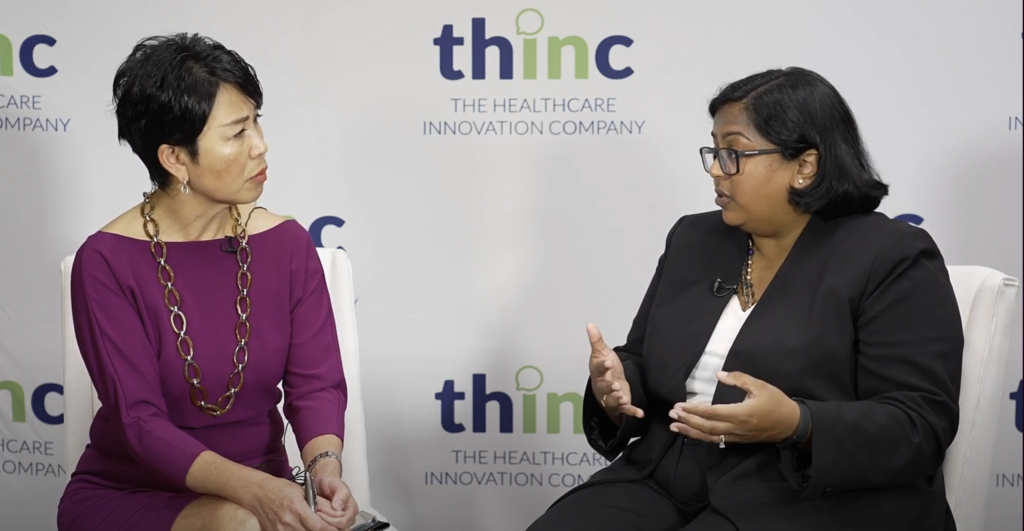Host Mabel Jong welcomes Dr. Shital Desai from Kaiser Permanente in Washington, DC, to discuss value-based care and the importance of data transparency in healthcare. Dr. Desai shares insights on leveraging electronic health records and artificial intelligence to improve patient outcomes. Discover how Kaiser Permanente is innovating in areas like coordinated cancer care and advanced care at home.
You can view the full video interview here.
Key Takeaways
- Value-Based Care: Kaiser Permanente focuses on delivering value-based care in DC, Maryland, and Virginia to improve patient outcomes.
- Data Transparency: Emphasizing data transparency and sharing information at the front-line levels is crucial for enhancing health equity and patient care.
- Artificial Intelligence Integration: Artificial intelligence is being utilized in Radiology and Pathology, aiding in early detection and improving diagnostic accuracy.
- Advanced Care at Home: Kaiser Permanente is exploring advanced care at home to reduce unnecessary hospitalizations and provide safer, more efficient patient care.
Key Takeaways on Value-Based Care and Data Transparency: An Interview with Dr. Shital Desai
Host Mabel Jong – thINc360:
“Welcome back. I’m Mabel Jong, and I’m very pleased to have with me now Dr. Shital Desai, who is with Kaiser based in Washington, DC, where we are today. Dr. Desai, thank you so much for your time today.”
Dr. Shital Desai:
“Thank you for having me.”
Host Mabel Jong – thINc360:
“It’s really a pleasure to be able to present. What are some of the key takeaways you want attendees to have when they leave this conference after hearing your presentation?”
Dr. Shital Desai:
“Sure. Well, I’ve had the opportunity to participate in two panels this morning, and I think the key takeaways that I want folks to hear about are how we are delivering value-based care in the Mid-Atlantic Permanente Medical Group here in DC, Maryland, and Virginia, and also how important it is to have data transparency and data to share at the frontline levels so that we’re being very transparent in terms of health equity and the care that we’re providing to our patients.”
Host Mabel Jong – thINc360:
“Data has actually been on the minds of many people. I remember when the electronic health records came out, that was a very transformative time. Now, we’re seeing a lot of physician burnout and some roadblocks with data. How best to use data in the coming years?”
Dr. Shital Desai:
“Yeah, that’s a great question. I would say that one of the things we’re focusing on at the Permanente Medical Group, you mentioned physician burnout, is ensuring that everybody’s working at the top of their license or at the top of their scope.
We’re using our electronic medical record to gather a lot of data around demographics, around social determinants of health, making sure that we’re able to integrate care across multiple specialties and multiple venues so that data is readily available when we’re taking care of patients.
That really reduces the burden on physicians and hopefully helps reduce the burnout a little bit. We’re also training the teams that we work with in terms of our nurses, our clinical assistants, and the techs that help us with care to make sure that they’re also working at the top of their license, helping us with data management so that the burnout is reduced for everybody.”
The Future of Data and AI in Healthcare: Insights from Dr. Shital Desai
Host Mabel Jong – thINc360:
“And where do you think data will go from here? How much more information will we be gleaning from patients’ profiles to help deliver better care?”
Dr. Shital Desai:
“I think it’s limitless. We’re seeing that more and more as more of our electronic medical records are talking with each other, and we’re able to see patient records from when they were in prior healthcare delivery systems.
It really does give us a more complete picture of a patient’s health, and then it allows us to deliver better care.”
Host Mabel Jong – thINc360:
“What about the introduction of artificial intelligence tools?”
Dr. Shital Desai:
“Yeah, absolutely. In Permanente medicine, our Chief Medical Information Officer, Dr. Ainsley McLean, she’s actually going to be speaking at this conference in a couple of days.
She’s led tremendous artificial intelligence innovation within our medical group. We’re using AI in terms of our radiology care, specifically with mammography, to be able to have early identification of areas that may be pre-malignant or malignant.
We’re also using AI in the pathology space, and then we’ve also started exploring artificial intelligence within our electronic medical record to be able to identify messages from patients when they’re using certain words in terms of the symptoms that they’re having to be able to flag that and raise the awareness of those patients so that we’re addressing them first.”
Improving Healthcare Delivery and Data Transparency: Dr. Shital Desai’s Perspective
Host Mabel Jong – thINc360:
“A lot of potential for sure.”
Dr. Shital Desai:
“Tremendous.”
Host Mabel Jong – thINc360:
“What are some of the things we could do better?”
Dr. Shital Desai:
“In terms of healthcare delivery?”
Dr. Shital Desai:
“And data?”
Dr. Shital Desai:
“Sure. I think being more transparent about sharing data in terms of our outcomes with our entire teams and even having that transparency with our patients.
I think it helps keep us accountable, quite frankly, and it increases the ownership that we have in terms of the care that we’re delivering.”
Host Mabel Jong – thINc360:
“Was that missing or is that missing now?”
Dr. Shital Desai:
“I wouldn’t say it’s missing, but I think there’s always opportunity for improvement.”
Host Mabel Jong – thINc360:
“Kaiser has always been a leader in many of the areas that they work in. What is coming ahead that we should be keeping our eye out for?”
Dr. Shital Desai:
“Sure. I think just seeing more of the value-based care, we’re really innovating constantly about how we can utilize our resources to improve the health outcomes for the entire patient populations that we serve.
Most recently, we’re seeing a lot more innovation in the space of coordinated cancer care. We’re seeing innovation in terms of care for our sickest patients.
We’re looking at patients who are at higher risk for hospitalization and who may have avoidable hospitalizations and how we can deliver more care at home.
We’re exploring a lot of that territory in terms of advanced care at home and how we can help keep patients safely at home when they may be getting unnecessarily admitted to the hospital, which puts them at risk for other illnesses.”
Importance of Delivering Key Messages at thINc360
Host Mabel Jong – thINc360:
“A powerful message. Why did you think it was important to deliver your messages here at this particular meeting?”
Dr. Shital Desai:
“Well, I think it’s such a great gathering of healthcare executives and leaders from different industries, different geographies across the country. It’s been incredibly rewarding to hear the perspectives and best practices from other organizations that we can then spread pretty quickly.”
Host Mabel Jong – thINc360:
“Dr. Desai, thank you so much.”
Dr. Shital Desai:
“Thank you for having me.”
Host Mabel Jong – thINc360:
“Thank you.”


